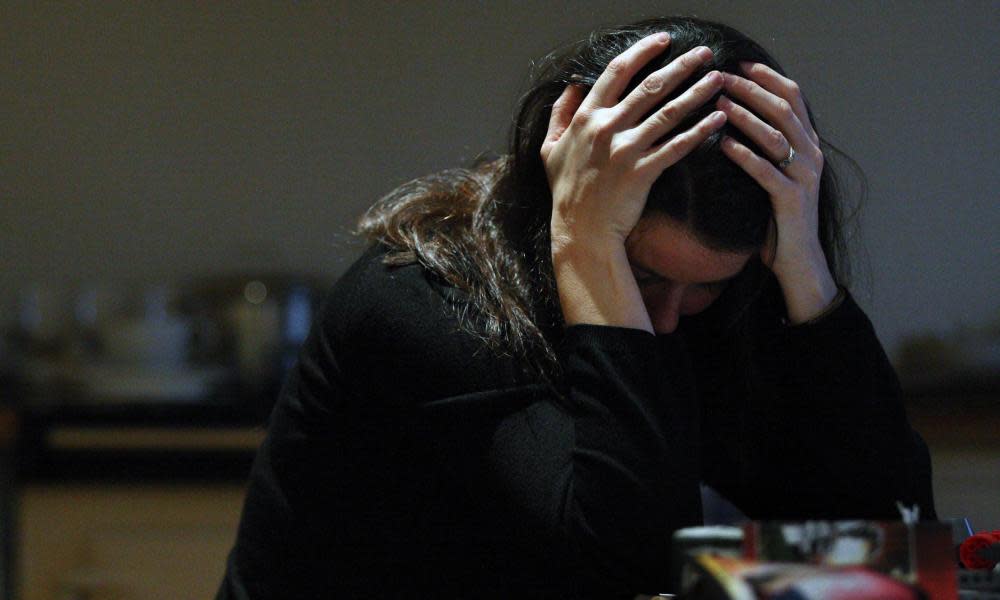Poverty and debt driving young women to self-harm – survey

Young women are being driven to self-harm as a result of poverty, debt and their struggles to pay household bills, research shows.
Women aged 16-34 from the poorest backgrounds are five times more likely to harm themselves than those from the most well-off families, according to the study by NatCen Social Research.
Its findings, released by the charity Agenda, show a close association between wealth and mental ill-health, and show that young women in poverty are much more likely to suffer psychologically.
Jemima Olchawski, Agenda’s chief executive, said NatCen’s research showed that the debate about the recent rise in mental health problems among young women – which often cites social media, exam stress and body image issues as negative influences – took too little account of deprivation.
“It’s devastating to see such high and increasing levels of self-harm among young women, especially those living in poverty and facing deprivation. This is especially concerning as we move into an economic downtown,” Olchawski said.
“The increase in self-harm among young women is deeply worrying. Yet the discussion around this issue and women and girls’ mental health is often very narrow, focusing on issues like social media rather than reflecting on wider causes. This research highlights the important relationship between self-harm and poverty.”
Agenda is an alliance of groups working to help young women and girls affected by abuse, poverty, poor mental health, addiction, homelessness and criminal justice issues.
There is mounting evidence that self-harm is on the increase in the population as a whole, and that teenage girls and young adult women are the most affected. The proportion of 16- to 24-year-old females who say they have self-harmed rose from 6.5% to 19.7% between 2000 and 2014, according to a previous study.
NatCen, which based its findings on face-to-face interviews with more than 20,000 people in England, also found other stark differentials in mental health related to young women’s financial circumstances.
One in five women aged 16-34 with serious money problems have self-harmed in the last year.
Self-harm is three times higher in women who have fallen behind on utility payments or who have had utilities disconnected (13%) than among those who have not (4%).
Women who say they do not feel safe in their neighbourhood are four times more likely to self-harm than those who do not.
Dr Mary-Ann Stephenson, the director of the Women’s Budget Group, said: “This powerful report shows the strong links between poverty, mental health and self-harming for younger women. We know that young women are particularly likely to have been hit badly by the economic impact of Covid-19, since they are more likely to work in sectors like hospitality and retail that have been closed down.”
Men, especially middle-aged men, are more likely to kill themselves than women. However, the suicide rate among girls and young women aged between 10 and 24 has risen: in 2018 it was the highest on record.
A recent report by Prof Sir Michael Marmot of University College London, called Health Equity in England Ten Years On, found that women in the poorest areas faced the worst health inequalities and that their life expectancy had fallen by 10% in the last decade.
Sally McManus, who led the research for NatCen, said: “People have become increasingly likely to report using non-suicidal self-harm as a way of coping and this increase is particularly apparent in young women. This report indicates that self-harm often occurs in the context of poverty and debt, especially for young women.”
Andy Bell, the deputy chief executive of the Centre for Mental Health thinktank, said: “This survey underlines that economic and social inequalities have a major impact on our mental health. Young women’s mental health has deteriorated significantly in the last decade, and those who are most disadvantaged are at a far greater risk still.
“The impact of Covid-19 on young women’s mental health is likely to add extra pressure both now and in the coming months and years. It’s vital that we take action now to protect mental health for all and reduce the inequalities that lie behind so much of the distress this survey has brought to light.”
A government spokesperson said: “We are absolutely committed to supporting everyone’s mental wellbeing, especially during this unprecedented period. Vulnerable young women can continue to access mental health services, including virtually, and we have released new tailored guidance to help people deal with this outbreak through practical tips and advice.”

 Yahoo News
Yahoo News 
